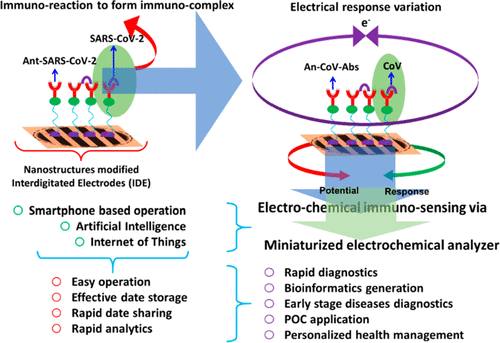当前位置:
X-MOL 学术
›
ACS Appl. Bio Mater.
›
论文详情
Our official English website, www.x-mol.net, welcomes your
feedback! (Note: you will need to create a separate account there.)
Electrochemical SARS-CoV-2 Sensing at Point-of-Care and Artificial Intelligence for Intelligent COVID-19 Management
ACS Applied Bio Materials ( IF 4.6 ) Pub Date : 2020-10-27 , DOI: 10.1021/acsabm.0c01004 Ajeet Kumar Kaushik 1 , Jaspreet Singh Dhau 2 , Hardik Gohel 3 , Yogendra Kumar Mishra 4 , Babak Kateb 5 , Nam-Young Kim 6 , Dharendra Yogi Goswami 7
ACS Applied Bio Materials ( IF 4.6 ) Pub Date : 2020-10-27 , DOI: 10.1021/acsabm.0c01004 Ajeet Kumar Kaushik 1 , Jaspreet Singh Dhau 2 , Hardik Gohel 3 , Yogendra Kumar Mishra 4 , Babak Kateb 5 , Nam-Young Kim 6 , Dharendra Yogi Goswami 7
Affiliation

|
To manage the COVID-19 pandemic, development of rapid, selective, sensitive diagnostic systems for early stage β-coronavirus severe acute respiratory syndrome (SARS-CoV-2) virus protein detection is emerging as a necessary response to generate the bioinformatics needed for efficient smart diagnostics, optimization of therapy, and investigation of therapies of higher efficacy. The urgent need for such diagnostic systems is recommended by experts in order to achieve the mass and targeted SARS-CoV-2 detection required to manage the COVID-19 pandemic through the understanding of infection progression and timely therapy decisions. To achieve these tasks, there is a scope for developing smart sensors to rapidly and selectively detect SARS-CoV-2 protein at the picomolar level. COVID-19 infection, due to human-to-human transmission, demands diagnostics at the point-of-care (POC) without the need of experienced labor and sophisticated laboratories. Keeping the above-mentioned considerations, we propose to explore the compartmentalization approach by designing and developing nanoenabled miniaturized electrochemical biosensors to detect SARS-CoV-2 virus at the site of the epidemic as the best way to manage the pandemic. Such COVID-19 diagnostics approach based on a POC sensing technology can be interfaced with the Internet of things and artificial intelligence (AI) techniques (such as machine learning and deep learning for diagnostics) for investigating useful informatics via data storage, sharing, and analytics. Keeping COVID-19 management related challenges and aspects under consideration, our work in this review presents a collective approach involving electrochemical SARS-CoV-2 biosensing supported by AI to generate the bioinformatics needed for early stage COVID-19 diagnosis, correlation of viral load with pathogenesis, understanding of pandemic progression, therapy optimization, POC diagnostics, and diseases management in a personalized manner.
中文翻译:

护理点电化学 SARS-CoV-2 传感和用于智能 COVID-19 管理的人工智能
为了应对 COVID-19 大流行,开发用于早期 β-冠状病毒严重急性呼吸综合征 (SARS-CoV-2) 病毒蛋白检测的快速、选择性、灵敏的诊断系统正在成为一种必要的应对措施,以生成有效检测所需的生物信息学。智能诊断、优化治疗以及研究更有效的治疗方法。专家建议迫切需要此类诊断系统,以便通过了解感染进展和及时做出治疗决策,实现管理 COVID-19 大流行所需的大规模和有针对性的 SARS-CoV-2 检测。为了实现这些任务,需要开发智能传感器来快速、选择性地检测皮摩尔水平的 SARS-CoV-2 蛋白。由于人与人之间的传播,COVID-19 感染需要在护理点 (POC) 进行诊断,而不需要经验丰富的劳动力和先进的实验室。考虑到上述因素,我们建议通过设计和开发纳米微型电化学生物传感器来探索分区方法,以在流行病现场检测 SARS-CoV-2 病毒,作为管理流行病的最佳方法。这种基于 POC 传感技术的 COVID-19 诊断方法可以与物联网和人工智能 (AI) 技术(例如用于诊断的机器学习和深度学习)连接,通过数据存储、共享和分析来研究有用的信息。考虑到与 COVID-19 管理相关的挑战和方面,我们在本次综述中提出了一种集体方法,涉及人工智能支持的电化学 SARS-CoV-2 生物传感,以生成早期 COVID-19 诊断、病毒载量与病毒载量的相关性所需的生物信息学。发病机制、对大流行病进展的了解、治疗优化、POC 诊断和个性化的疾病管理。
更新日期:2020-11-16
中文翻译:

护理点电化学 SARS-CoV-2 传感和用于智能 COVID-19 管理的人工智能
为了应对 COVID-19 大流行,开发用于早期 β-冠状病毒严重急性呼吸综合征 (SARS-CoV-2) 病毒蛋白检测的快速、选择性、灵敏的诊断系统正在成为一种必要的应对措施,以生成有效检测所需的生物信息学。智能诊断、优化治疗以及研究更有效的治疗方法。专家建议迫切需要此类诊断系统,以便通过了解感染进展和及时做出治疗决策,实现管理 COVID-19 大流行所需的大规模和有针对性的 SARS-CoV-2 检测。为了实现这些任务,需要开发智能传感器来快速、选择性地检测皮摩尔水平的 SARS-CoV-2 蛋白。由于人与人之间的传播,COVID-19 感染需要在护理点 (POC) 进行诊断,而不需要经验丰富的劳动力和先进的实验室。考虑到上述因素,我们建议通过设计和开发纳米微型电化学生物传感器来探索分区方法,以在流行病现场检测 SARS-CoV-2 病毒,作为管理流行病的最佳方法。这种基于 POC 传感技术的 COVID-19 诊断方法可以与物联网和人工智能 (AI) 技术(例如用于诊断的机器学习和深度学习)连接,通过数据存储、共享和分析来研究有用的信息。考虑到与 COVID-19 管理相关的挑战和方面,我们在本次综述中提出了一种集体方法,涉及人工智能支持的电化学 SARS-CoV-2 生物传感,以生成早期 COVID-19 诊断、病毒载量与病毒载量的相关性所需的生物信息学。发病机制、对大流行病进展的了解、治疗优化、POC 诊断和个性化的疾病管理。











































 京公网安备 11010802027423号
京公网安备 11010802027423号